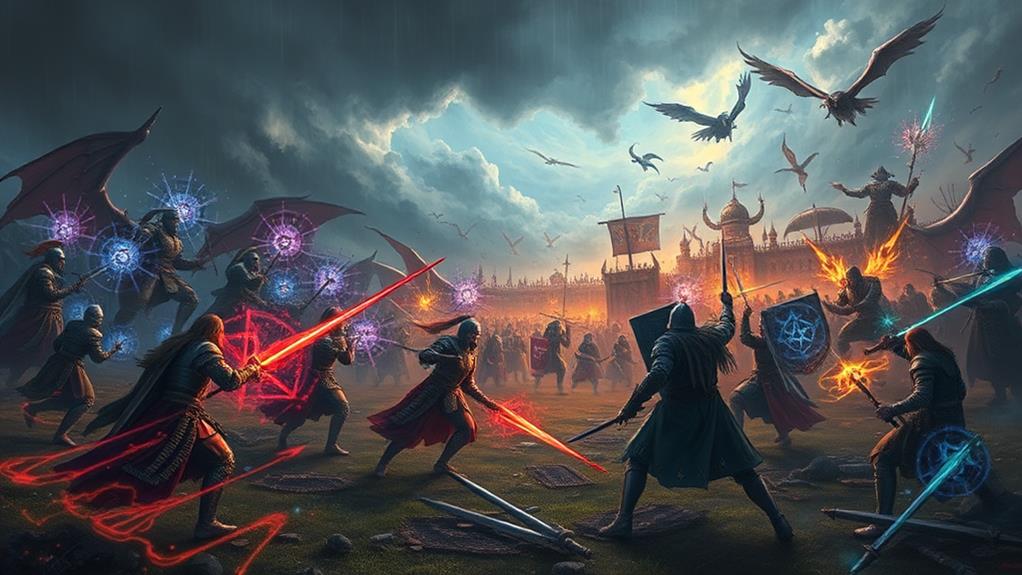
Magic in Earth battles has been a game-changer, tilting the scales in various historical conflicts. By integrating spells, enchantments, and mystical forces, generals and soldiers gained unparalleled advantages. Shamans, druids, and sorcerers conjured storms, produced illusions, and summoned the dead, creating chaos and fear. Healing magic kept troops fighting, while magical artifacts like Excalibur empowered leaders with immense strength. These arcane forces influenced strategies, providing real-time insights and deceptive tactics. Ethical considerations, however, necessitated a careful balance to avoid catastrophic consequences. Curious about how magic continued to shape warfare and its long-term impacts on history and society?
Historical Context of Magic
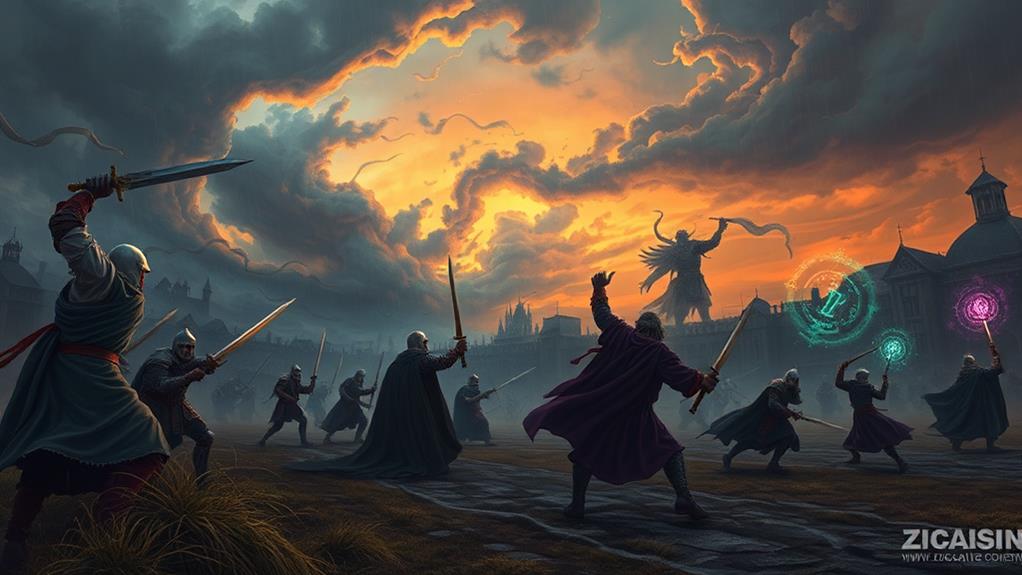
How has magic influenced the course of history in Earth battles? You might be surprised to know that magic has played vital roles in many pivotal moments. Imagine ancient armies calling upon mystical forces to sway the tide of conflict. Envision shamans, druids, and sorcerers weaving spells that could turn the battlefield into a domain where the supernatural reigned supreme.
Throughout history, generals and warriors have relied on magical practices to gain an edge. From the enchantments of Merlin that supposedly aided King Arthur, to the mystical runes believed to protect Viking warriors, magic has been a hidden hand guiding the outcomes of many wars. You see, it wasn't just about brute force or strategic genius; sometimes, it was the unseen forces that made all the difference.
In medieval times, alchemists and magicians were often consulted for their knowledge of the arcane. Their potions and charms were thought to bolster courage, heal wounds, and even summon storms to thwart enemies. You can't overlook the psychological impact either; the mere belief in magic could boost morale or instill fear, tipping the scales in unpredictable ways. So, magic's influence on Earth battles is both profound and enduring.
Types of Magical Forces
Magic's impact on historical battles is undeniable, but what kinds of magical forces were at play? You'll find that magic in warfare often falls into several key categories. First, there's elemental magic. This type involves harnessing natural elements like fire, water, earth, and air to create devastating attacks or formidable defenses. Imagine summoning a firestorm to decimate enemy ranks or using water to flood and disrupt advancing troops.
Next, there's illusion magic. This force can deceive enemy soldiers, creating phantom armies or disguising the true strength and position of your forces. By manipulating perceptions, you can gain a significant tactical advantage, causing confusion and hesitation among your adversaries.
Healing magic also plays a vital role. It allows armies to recover quickly from injuries, keeping soldiers in fighting condition for longer. This type of magic can turn the tide of battle by ensuring that your troops remain resilient and capable.
Finally, there's necromancy. This darker form of magic involves raising the dead to bolster your ranks. While controversial and morally complex, necromancers have been known to turn fallen soldiers into relentless, undead warriors.
Understanding these types of magical forces helps you appreciate the diverse ways magic has shaped historical conflicts.
Notable Magical Artifacts
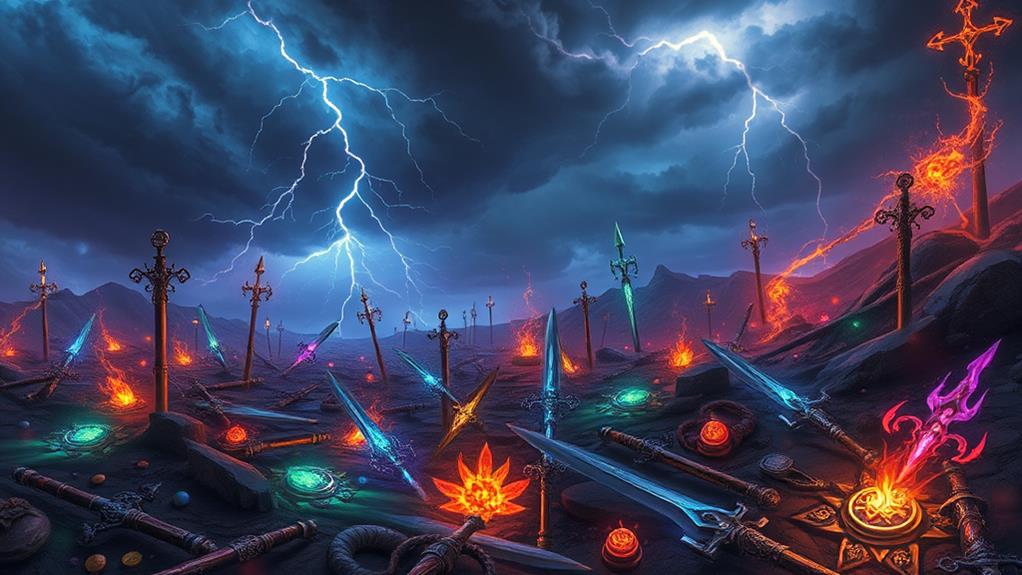
Magical artifacts have played a pivotal role in shaping the outcomes of numerous historical battles. Think of Excalibur, King Arthur's legendary sword. This blade wasn't just a weapon; it was imbued with immense magical power, granting its wielder unmatched strength and invincibility. The mere presence of Excalibur on the battlefield could turn the tide in favor of its bearer.
Another artifact of great renown is the Staff of Merlin. This powerful staff allowed Merlin to cast spells of protection, deception, and destruction, making him a formidable force in any conflict. It's said that without this staff, Merlin's magic would've been far less potent, altering the course of many battles he influenced.
Consider the Amulet of Ra, an ancient Egyptian artifact. This amulet could channel the sun god's energy, providing its possessor with the power to summon blinding light and scorching heat. Armies equipped with the Amulet of Ra could easily disorient and decimate their enemies.
Key Magical Figures
Throughout history, certain individuals have wielded extraordinary magical abilities that shaped the course of battles and even entire wars. You've probably heard of Merlin, the legendary wizard who advised King Arthur. His enchantments and foresight were pivotal during the conflicts of Camelot, often turning the tide in favor of the Knights of the Round Table.
Another key figure is Joan of Arc, whose divine visions and miraculous feats on the battlefield led France to significant victories during the Hundred Years' War. She claimed her powers came from God, but many believe magic played a vital role.
Then there's Rasputin, the mystic advisor to the Russian royal family. He allegedly possessed healing abilities and unexplainable influence, which some say were instrumental during the political turmoil before the Russian Revolution. His mysterious powers left a lasting impact on Russian history.
You can't overlook the cunning Morgana le Fay, often depicted as Merlin's adversary. Her dark magic and strategic mind made her a formidable force in Arthurian legends. These figures didn't just participate in battles; they changed their outcomes, proving that individual magical prowess can be as influential as any army.
Magic in Strategic Planning
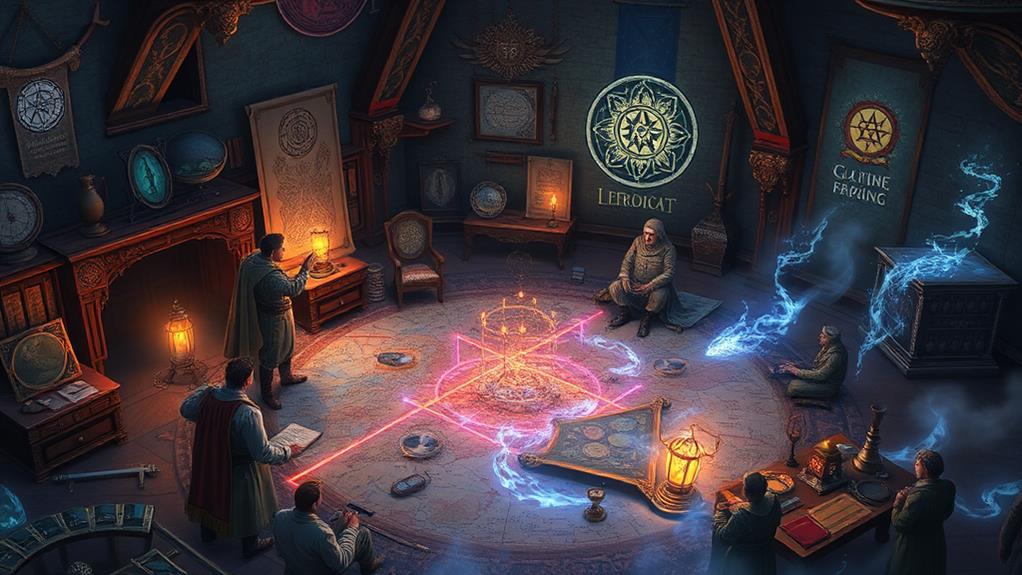
These influential individuals weren't just powerful on the battlefield; their magical abilities often played a pivotal role behind the scenes. When you're planning a strategy, you can't underestimate the value of magical insight. Divination spells can reveal enemy movements, while scrying provides real-time surveillance of critical areas. You're not just guessing; you're operating with information that gives you a significant edge.
Imagine you're in a war council. You've got wizards who can cast spells to foresee the outcomes of different strategies. This foresight allows you to adjust plans before committing troops, saving lives and resources. Illusion magic can create false battle plans to mislead enemies, making your actual strategy more effective.
Furthermore, magical communication spells guarantee that your orders reach distant units instantly. No more reliance on slow messengers or vulnerable communication lines. When coordinating multi-front battles, this instantaneous correspondence is invaluable.
Defensive Uses of Magic
When defending your territory, the strategic deployment of magical barriers can make a world of difference. These barriers, when properly conjured, can protect against a variety of threats, from physical projectiles to more sinister magical attacks. By leveraging defensive spells, you can create a formidable shield around your stronghold, ensuring that your assets and personnel remain safe.
Here's a quick rundown of key defensive uses of magic:
- Barrier Spells: These create invisible walls that can block incoming attacks. They can be customized to repel specific types of magic or physical force.
- Warding Rituals: By setting up wards around your perimeter, you can detect and repel intruders before they even get close. These wards can trigger alarms or countermeasures when breached.
- Healing Enchantments: Defensive magic isn't just about blocking attacks. Healing enchantments can be placed strategically to instantly heal injured allies, keeping your forces combat-ready.
- Illusion Spells: Use illusions to create decoys or hide critical areas from enemy sight. This can confuse attackers and buy you valuable time to mount a counteroffensive.
Ethical Considerations of Magic
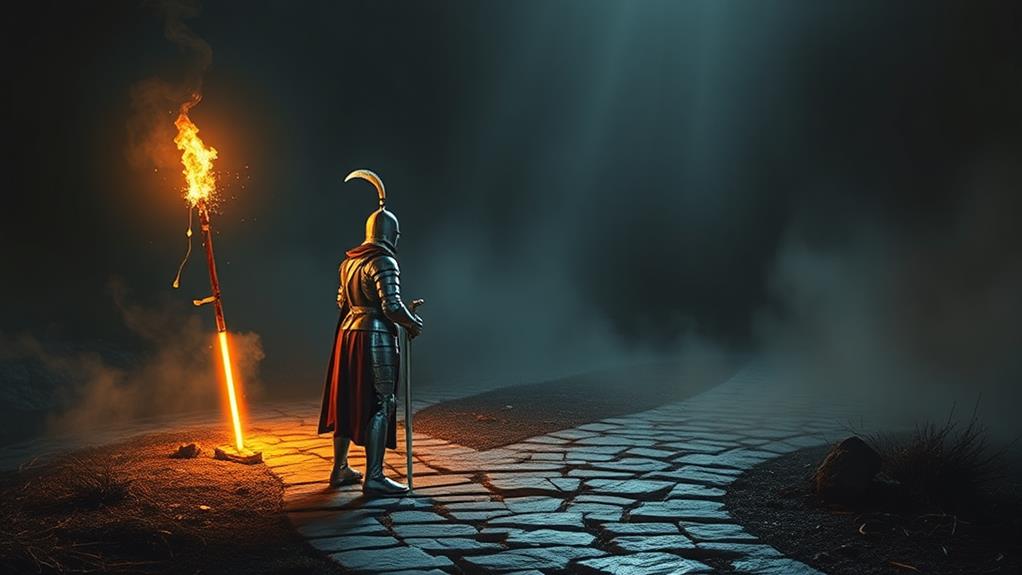
Steering the ethical considerations of magic requires a keen sense of responsibility and foresight. You can't just wield magical powers without thinking about the consequences. Imagine you have the ability to conjure fire or manipulate minds. If used recklessly, these abilities can cause immense harm, both to individuals and societies. Crucial to weigh the potential benefits against the possible damage.
When you use magic in battle, you must consider the collateral damage. Are you endangering innocent lives, or causing irreversible environmental harm? Magic that alters the landscape or affects the climate can have long-lasting effects, far beyond the immediate conflict. You need to ask yourself if the ends truly justify the means.
Moreover, there's the issue of fairness. Using magic to overpower adversaries who don't possess similar abilities raises questions of equity and justice. It creates a power imbalance that can lead to further conflict and resentment. You must seek to use magic in ways that align with ethical principles and promote peace.
In essence, wielding magic in battles isn't just about power, but about making morally sound decisions that respect life and the natural world.
At a Glance
So, you're thinking magic is the ultimate game-changer in earth battles, huh? Well, prepare to be dazzled by illusions of grandeur and spells that can barely light a campfire. Sure, it's got its glitzy artifacts and legendary wizards, but when the dust settles, it's mostly smoke and mirrors. Plan your strategy, cast your spells, but don't forget—sometimes, a good old-fashioned sword does the trick better than an incantation. Happy battling!





